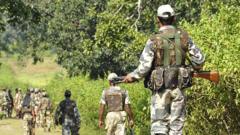In a significant development in India’s decades-long struggle against Maoist insurgents, a top leader named Nambala Keshava Rao, also referred to as Basavaraju, was killed during a confrontation with security forces in Chhattisgarh. Home Minister Amit Shah reported that Rao was among 27 rebels who died in this encounter, which also claimed the life of one police officer. This event is notable as it's the first time in thirty years that a leader of Rao's stature has been taken down.
Rao served as the general secretary of the banned Communist Party of India (Maoist), and he was featured on the National Investigation Agency's most wanted list. Following an intelligence tip-off about the presence of senior Maoist figures in Narayanpur district, security forces initiated the gunfight.
Indian Prime Minister Narendra Modi expressed pride in the forces for their success, while the Communist Party of India condemned the violence, calling for an independent investigation. This operation coincides with a broader military initiative, termed Black Forest, that has led to the arrest of 54 rebels and 84 surrenders in Chhattisgarh, Telangana, and Maharashtra.
Despite some successes, clashes between security forces and rebels remain frequent, often resulting in casualties. The Maoist conflict, which began in the late 1960s, now spans over a third of India's districts, marking a persistent challenge for the government. Over 10,000 lives have been lost since its inception, showcasing the deep-rooted tensions in the region.




















